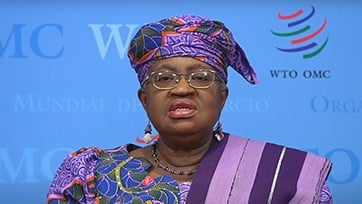DG Okonjo-Iweala: Las mujeres deben ocupar un lugar central en el comercio para que el futuro sea más próspero

El comercio debe utilizarse como vehículo para poner fin a la marginación de las mujeres en la economía mundial en un contexto de crecientes desigualdades de género derivadas de la crisis ocasionada por la COVID-19, dijo la Directora General Ngozi Okonjo-Iweala en un mensaje de vídeo publicado el 8 de marzo con ocasión del Día Internacional de la Mujer. Asimismo, la Directora General dijo que la labor de la OMC puede ayudar a reducir los costos relacionados con el comercio para las empresas, incluidas las que pertenecen a mujeres, y también a establecer políticas específicas para que el sistema multilateral de comercio tenga más en cuenta las cuestiones de género. A continuación figura la transcripción del mensaje de vídeo de la Directora General.
(de momento sólo en inglés)
On this International Women’s Day, my heart goes out to the millions of women and girls who are suffering in Ukraine. I pray for a swift and peaceful end to the war that has already taken so many lives.
In 1948, in the wake of the Second World War, the world’s governments adopted the Universal Declaration of Human Rights, proclaiming that «All human beings are born free and equal in dignity and rights.»
We have made considerable progress, since then, but women still face so many obstacles to equality, including in the economy. According to the International Labour Organization, only 43% of the world’s working-age women were employed in 2021, compared to 69% of working-age men. The World Bank estimates that on average, women have just three-quarters of the legal rights afforded to men. 95 countries do not guarantee equal pay for equal work.
COVID-19 has exacerbated many of these inequalities. As of September 2021, women or girls were 2.4 times likelier than men or boys to have foregone paid work to care for others, 21% likelier to have dropped out of school, and 23% likelier to have reported an increased in gender-based violence.
The pandemic has also widened inequalities in international trade. While some women-led companies did successfully move online, or pivot to new activities, others closed operations, and women were overrepresented in sectors hit hard by the pandemic like tourism, food services, and retail. Businesses led by men are now nearly twice as likely as those led by women to be connected to international value chains, according to the Global Entrepreneurship Monitor.
Narrowing gender gaps in trade and the wider economy is not just the morally right thing to do, it is the smart economic thing to do. It would help strengthen a post-pandemic economic recovery that remains fragile and uneven, by bolstering growth, job creation, and supply capacity.
When women engage in paid work, it can be transformative for them as individuals, for their families, and for entire societies. One estimate suggests that simply raising female labour force participation rate to equal the rate for men would boost GDP by 5 percent in the United States, 9 percent in Japan, and 34 percent in Egypt. More recent work by IMF researchers argues the gains would be even larger, since greater gender diversity is linked with higher productivity.
Trade is a vehicle for creating more – and better – jobs for women. WTO and World Bank research shows that women working in export sectors earn more than in non-export sectors, and are more likely to have formal jobs.
Ending marginalisation in the global economy for women-owned businesses demands action across two broad fronts.
The first deals with reducing trade-related costs for all businesses, since these costs weigh more heavily on the smaller companies women typically run. This involves implementing existing WTO rules such as the Trade Facilitation Agreement, as well as the new agreement on services domestic regulation reached by 67 members in December. And it means concluding ongoing talks in areas such as e-commerce, where 86 members can enhance predictability and lower costs by establishing some baseline international rules for the digital arena.
The second, related, front deals with targeted policies to benefit women and the businesses they own.
This also includes supply-side action like the work that the Enhanced Integrated Framework, the Standards and Trade Development Facility and the International Trade Centre do with women-owned businesses to help them overcome the full range of barriers keeping them out of international markets. These obstacles range from weak business networks and poor access to market information, to meeting global health and safety standards.
A large group of WTO members have also been taking steps froward on the policy side to make the multilateral trading system more gender-responsive. After agreeing, five years ago, to shed a spotlight on barriers facing women in global trade, from unequal access to trade financing to sub-optimal participation in public procurement markets, they have set up an Informal Working Group to look at options for future policy action and rulemaking. One important area where they are poised for action is collecting gender-disaggregated data – right now it is often hard to target support at women because governments simply do not know where the trade-related problems are. Such information is powerful because it can help us solve women’s real world trade-related problems.
I often say that the future of trade is digital, services, and green. But, to build the equitable and prosperous societies we need, the future of trade is also women. Women must be at the front and centre, in the economy and in trade as we seek to recover sustainably from the pandemic.













